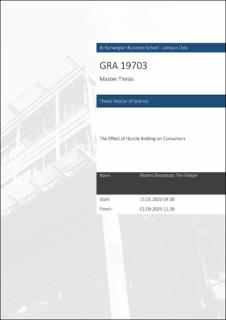| dc.description.abstract | The purpose of this master thesis is to investigate if consumers change their
perception of a firm after being exposed to a hostile bidding advertisement in
Google. Hostile bidding is a strategy in search engines where firms buy their
competitor’s brand names in order to be displayed over them in the search results.
Previous literature on hostile bidding has mainly focused on implications for the
firm and has missed a significant part of the equation, the consumer. Based on this
information, we created four hypotheses that focused on brand perception, attitude
towards advertisement, and how fair the consumer believes the hostile bidding
marketing strategy to be.
Results from over 350 participants show that if a firm decides that they want to buy
their competitor’s brand name, then it would not affect their brand perception. The
results also show that if a firm with low brand awareness goes after and buys
keywords connected to the brand name of a firm with high awareness, then the
hostile advertisement is affected negatively. Showing that even though the firm's
with low brand recognition does not get hurt in terms of brand perception, if they
use a hostile bidding strategy, their advertisements might get negatively affected.
Managers could efficiently apply this insight when making online marketing
decisions, by using our findings as guidance for when to execute a hostile bidding
strategy and when to not. | en_US |
